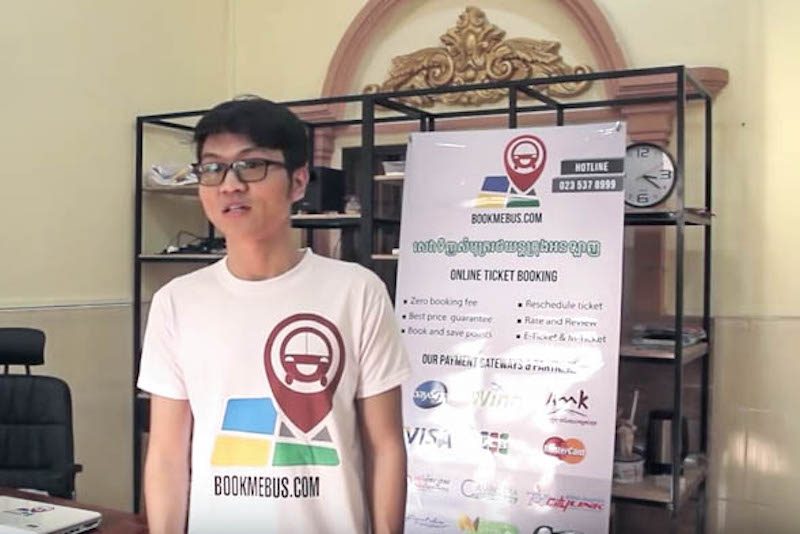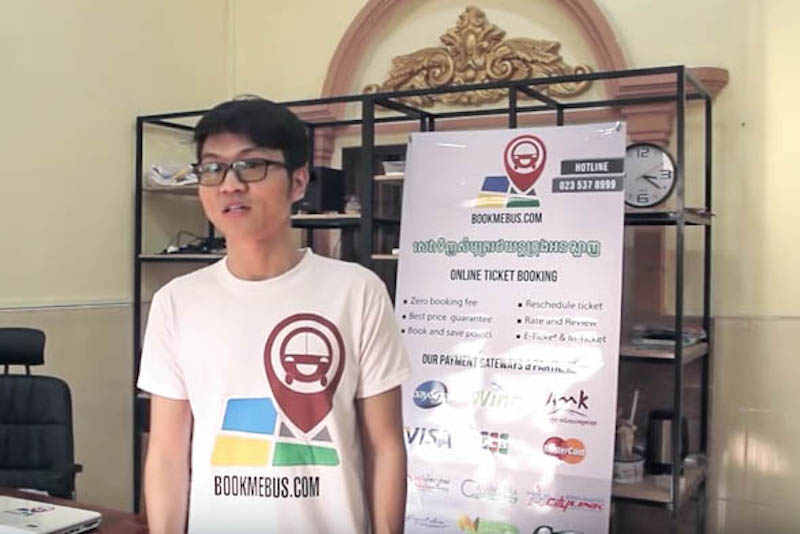Chea Langda, the founder of startup BookMeBus, didn’t know what to expect when he was referred to a meet-up with a group of foreign angel investors last year at Impact Hub Phnom Penh.
“I only went because I thought: I’d better give them the benefit of the doubt,” Mr. Langda said.

At that gathering at Impact Hub’s old office on the second floor of Joma Cafe Norodom, Langda was introduced to David Beatty and Jo Ann Corkran, who had come to Cambodia looking to invest here for the first time. When his turn came to make a pitch, Mr. Langda eagerly told them that BookMeBus.com could become Cambodia’s main system for reserving millions of bus and ferry trips every year.
The investors peppered him with questions, from how he estimated his market size to how he had generated his revenue models. Mr. Langda said the meeting last November quickly taught him that he and his team were still just “babies.”
They hadn’t realized what it really took to make a professional investor pitch. “We weren’t sure how big our market was and who our target customers were,” he said. “We were critically challenged by the angel investors during the Q&A session after the pitch.”
In the year since that first nerve-wracking meeting, the investors have put more than money into the company. Perhaps most importantly, BookMeBus gained the mentorship of experienced entrepreneurs who have guided the startup during a period in which it has nearly doubled its monthly ticket sales.
Building an angel investor network in Cambodia is a key plank in boosting the country’s entrepreneurship, according to the Mekong Business Initiative, which organized last year’s gathering and two following rounds. Funded by the Asian Development Bank and Australian Aid, the $10 million initiative seeks to build small- and medium-enterprises in Cambodia, Laos, Burma and Vietnam, while promoting alternative sources of financing, knowledge and partnerships.
Angel investors—high net-worth individuals who invest their time and money in early-stage firms—tick those boxes. Mr. Beatty, who invested in BookMeBus, said the angel-investor concept began in California when successful entrepreneurs began taking chances on high-risk technology companies.
“You are investing in people, and you believe in their ability to create a successful business,” he said. “What matters is the ability of the team to create a business around an idea. The idea doesn’t create the business: People create business.”
Another example of a Cambodia-based business involved with angel investors is Japanese entrepreneur Takeshi Izuka’s Vkirirom, a resort and boarding school-style university in Kompong Speu province that raised $3 million in a round of financing from angel investors in July, Mr. Izuka said.
A primary challenge for Cambodian startups is the lack of options for shareholders to profitably exit their investments, which typically occurs when a company is acquired or lists on the stock exchange, Mr. Izuka said. For Vkirirom, the solution was to base the company in Singapore, even as it operated in Cambodia, creating the possibility of an exit via the Singaporean bourse—on which Mr. Izuka hopes to list by 2020. Thirty percent of Vkirirom’s equity is held by angel investors.
“Angel investors need exits,” he said. “The Cambodian stock exchange is not very liquid, and in my case, angel investors wouldn’t agree to invest in Cambodia because of that…. Acquisition is also not an option either because there are no buyers.”
Rajiv Biswas, Asia-Pacific chief economist at London-based market information company HIS Markit, said that despite the challenges, angel investors could plug a funding gap for Cambodian businesses.
“As banks are often reluctant to lend to startup companies, angel finance can help to accelerate the development of Cambodian-owned technology startups, which may help the growth of Cambodia’s high technology sector.” Mr. Biswas said.
Khemara Ros, the Cambodia country director for MBI, said the three rounds of meetings with angel investors organized so far in Cambodia had already borne significant fruit, with 27 angel investors having visited the country, creating the momentum for local businesspeople to organize their own angel- investor network as part of the Cambodia Investor Club.
MBI would give technical assistance to those local investors as they attempt to develop an environment that can prop up the financing of Cambodian innovators, Mr. Ros said.
For startups, the arrival of angel investors means greater opportunities, and the possibility of receiving a shot in the arm to stimulate rapid growth like that BookMeBus has experienced.
Alongside booming ticket sales, the past few months have seen the estimated market value of the company rise almost threefold, Mr. Langda said. As its founder, Mr. Langda invested about $35,000 at the beginning of its operation, he said. Now, based on the evaluation of his angel mentors, the business is worth up to $100,000.
The team also has come a long way from its first pitch at Joma Cafe. Under the guidance of more experienced operators, they have learned the ropes and picked up the skills and knowledge essential to surviving. “Now, we are mature,” Mr. Langda said.




